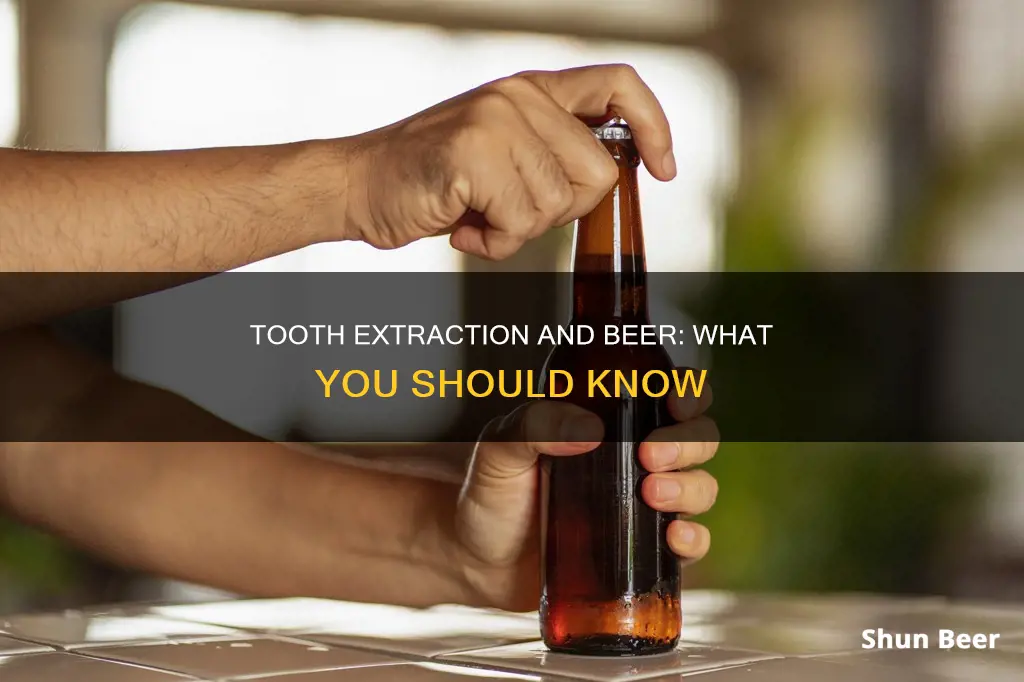
After a tooth extraction, it's important to follow your dentist's aftercare instructions to ensure a smooth and speedy recovery. But what about that beer in the fridge? Can you drink alcohol after a tooth extraction, or will it hinder the healing process? Here's what you need to know.
| Characteristics | Values |
|---|---|
| Alcohol consumption after tooth extraction | Not recommended |
| Reason | Alcohol can cause dehydration and may inhibit the healing process, potentially leading to complications such as dry socket or infection. |
| How long to wait after tooth extraction to consume alcohol | 72 hours to 10 days |
| Alternative drinks | Water or lukewarm tea |
| Alcohol consumption with pain medication | Can increase the risk of negative side effects and interactions, such as dizziness, nausea, and impaired judgment |
What You'll Learn
- Dentists recommend avoiding alcohol after a tooth extraction
- Drinking alcohol can cause a painful condition called dry socket
- Alcohol can hinder the body's natural healing process
- Drinking alcohol while taking pain medication can increase the risk of negative side effects
- It's best to wait until you no longer require painkillers before drinking alcohol

Dentists recommend avoiding alcohol after a tooth extraction
While it may be tempting to relax with a beer or a glass of wine after a tooth extraction, it's best to avoid alcohol to ensure a smooth and speedy recovery. Here's why dentists recommend steering clear of alcoholic beverages during the healing process:
Risk of Delayed Healing
Dentists advise against drinking alcohol after a tooth extraction because it can hinder the healing process. Alcohol can thin the blood and prevent clotting, which is necessary for the wound to heal properly. A blood clot needs to form in the extraction area to protect the underlying bone and nerves. If the blood doesn't clot or the clot is dislodged too soon, it can lead to a condition called dry socket, where the nerves and bones near the extraction site are exposed. This can cause pain and increase the risk of infection, slowing down the recovery process.
Dehydration
Alcohol is a diuretic, which means it can lead to dehydration. After a tooth extraction, it is crucial to stay hydrated to promote healing. Drinking alcohol can dehydrate the body and interfere with the natural healing process.
Interaction with Pain Medication
It is common to experience discomfort after a tooth extraction, and your dentist may prescribe pain medication to help manage it. However, consuming alcohol while taking certain painkillers can be dangerous. Mixing alcohol with pain medication can increase the risk of negative side effects and interactions, such as dizziness, nausea, and impaired judgment. It is advisable to wait until you no longer need pain medication before resuming alcohol consumption.
Increased Risk of Infection
Alcohol can also increase the risk of infection at the extraction site. It can hinder the body's natural inflammatory processes and collagen production, which are necessary for wounds to close and heal properly. This can lead to complications that may require additional treatment.
What to Do Instead
Instead of reaching for an alcoholic drink, it is recommended to drink plenty of water to stay hydrated and aid the healing process. You can also choose other hydrating beverages, such as lukewarm tea. It is also important to follow your dentist's aftercare instructions, get plenty of rest, and eat nutritious, soft foods.
In summary, while it may be tempting to unwind with an alcoholic beverage after a tooth extraction, it is best to avoid alcohol to ensure a smooth and quick recovery. Alcohol can interfere with the healing process, increase the risk of infection, and cause dangerous interactions with pain medication. By following your dentist's advice and choosing non-alcoholic beverages, you can help promote a healthy and complication-free recovery.
Beer After Dinner: A Healthy Choice?
You may want to see also

Drinking alcohol can cause a painful condition called dry socket
Drinking Alcohol After a Tooth Extraction Can Cause Dry Socket
Tooth extraction is a stressful experience, and it's understandable if you want to unwind with a beer after your surgery. However, it's important to know that drinking alcohol after a tooth extraction can cause a painful condition called dry socket and hinder your recovery process.
Dry socket is a painful condition that occurs when the blood clot over the extraction site is dislodged or fails to form, exposing the underlying nerves and bones. Once a tooth is removed, a blood clot needs to form to protect the underlying bone and nerves and allow the wound to heal properly. This clot acts as a shield, stopping bacteria from forming and preventing infection.
Research has shown that alcohol has a blood-thinning effect, which can prevent a clot from forming or cause an existing clot to dislodge. In addition, alcohol is an oral irritant that can inflame tissues and reduce saliva production, making it harder for clots to form and increasing the risk of prolonged bleeding.
How to Prevent Dry Socket
To prevent dry socket and promote healing, it's recommended to avoid alcohol for at least 72 hours after a tooth extraction, with a longer wait time of 7 to 10 days being ideal. During this time, drinking water is recommended to stay hydrated and aid in the healing process. It's also important to follow your dentist's aftercare instructions, such as avoiding straws, smoking, and vigorous mouth rinsing, as these activities can also increase the risk of dislodging the blood clot.
In conclusion, while it may be tempting to reach for an alcoholic beverage after a tooth extraction, it's important to avoid alcohol consumption to prevent dry socket and give your body the best chance for a successful and comfortable recovery.
Craft Beer Festivals: All-You-Can-Drink Events?
You may want to see also

Alcohol can hinder the body's natural healing process
After a tooth extraction, a blood clot must form over the extraction site to protect it and allow it to heal properly. This process typically takes about a week. Alcohol consumption can hinder this process in several ways.
Firstly, alcohol is a blood thinner and can prevent blood from clotting. This makes it more likely for a condition called dry socket to occur, where the blood clot dislodges prematurely, leaving the nerves and bones near the extraction site vulnerable to bacterial infection. Dry socket not only causes pain but also slows down the healing process, requiring additional treatment.
Alcohol consumption can also cause dehydration, which can lead to the blood clot becoming dry and dislodging. This, again, increases the risk of developing dry socket and experiencing associated complications.
In addition, alcohol can interact with pain medications that may be prescribed after a tooth extraction, increasing the risk of negative side effects such as dizziness, nausea, and impaired judgment. It is generally recommended to wait until you have stopped taking pain medication before resuming alcohol consumption.
To promote a smooth and speedy recovery after a tooth extraction, it is best to abstain from alcohol for at least 72 hours and ideally for 7 to 10 days to allow the blood clot to fully form and the extraction site to heal. Staying hydrated by drinking water is crucial during this time, but it is important to avoid drinking through a straw as this can also dislodge the blood clot.
Beer Consumption and Liver Cancer: Is There a Link?
You may want to see also

Drinking alcohol while taking pain medication can increase the risk of negative side effects
After a tooth extraction, it is best to avoid drinking alcohol, especially if you are taking pain medication. Drinking alcohol while taking pain medication can increase the risk of negative side effects and interactions.
Firstly, alcohol can delay the healing process after a tooth extraction. It can cause dehydration, thinning your blood when it needs to form a clot in the empty socket. This can lead to a condition called dry socket, where the blood clot becomes dry and dislodges, causing pain and slowing down the recovery process.
Secondly, alcohol can interact with pain medications, leading to a range of negative side effects. These side effects include dizziness, drowsiness, impaired judgment, nausea, vomiting, loss of coordination, difficulty breathing, internal bleeding, heart problems, and liver damage. The combination of alcohol and pain medication can also increase the risk of overdose and death.
Additionally, alcohol affects women and the elderly differently. Women tend to have a higher concentration of alcohol in their bloodstream compared to men when consuming the same amount. This makes them more prone to dangerous drug interactions and alcohol-induced health issues. The elderly are also more at risk as their bodies take longer to break down alcohol, and they are more likely to be prescribed medications that interact with alcohol.
Therefore, it is generally recommended to avoid alcohol completely while taking pain medication after a tooth extraction. It is important to follow your dentist's aftercare instructions and consult your healthcare provider for personalized advice based on your specific medication and health condition.
Drinking Beer with Amoxicillin: What You Need to Know
You may want to see also

It's best to wait until you no longer require painkillers before drinking alcohol
It's generally best to wait until you no longer need painkillers before drinking alcohol after a tooth extraction. This is because some pain medications can be dangerous when mixed with alcohol, increasing the risk of negative side effects and interactions. It's important to follow your dentist's advice on how long to abstain from alcohol, as well as any other aftercare instructions they provide.
After a tooth extraction, a blood clot needs to form over the extraction site to protect it and allow it to heal properly. This process typically takes about a week, and drinking alcohol can interfere with it. Alcohol can thin the blood and prevent clotting, increasing the risk of a painful condition called dry socket, where the nerves and bones near the extraction site are left vulnerable to bacterial infection. This can slow down the healing process and cause discomfort.
To promote a smooth recovery, it's recommended to get plenty of rest, use ice to reduce swelling, avoid using straws or spitting, and stick to soft, nutritious foods. It's also crucial to stay hydrated by drinking plenty of water, as dehydration can also hinder the clotting process.
While it may be tempting to reach for an alcoholic beverage to relax after a tooth extraction, it's best to prioritize your recovery by avoiding alcohol and following your dentist's recommendations. This will help ensure a quick and comfortable healing process, allowing you to get back to your normal routine as soon as possible.
Crafting Beer: My Career Choice and Passion
You may want to see also
Frequently asked questions
No, it is not recommended to drink beer or any other alcoholic beverage after a tooth extraction. Alcohol can hinder the healing process and cause dehydration, increasing the risk of a painful condition called dry socket.
After a tooth extraction, a blood clot must form over the extraction site to protect it and allow it to heal properly. Alcohol can thin the blood and prevent it from clotting, making dry socket more likely to occur.
It is recommended to wait at least 72 hours and ideally 7-10 days after a tooth extraction to allow the blood clot to fully form and the extraction site to heal.
It is important to stay hydrated during the healing process, so drinking water is recommended instead of beer or other alcoholic beverages.
Yes, it is recommended to avoid strenuous physical activity, rinsing or spitting too vigorously, and using tobacco or vaping products for at least the first few days after the procedure. It is also important to follow any specific aftercare instructions provided by your dentist.







